When it comes to using pepper spray, knowing the laws is super important so you don't get into trouble. Rules can change based on where you live, like some states allowing unrestricted carry while others have strict size limits. You must use it only for self-defense, not out of anger. Also, check the minimum age, because some places let teens as young as 16 carry it with permission. Remember, misusing pepper spray can land you with serious fines or even jail time. Stay safe and smart—keeping informed helps you use it responsibly and avoid any legal mess!
Overview of Pepper Spray Regulations
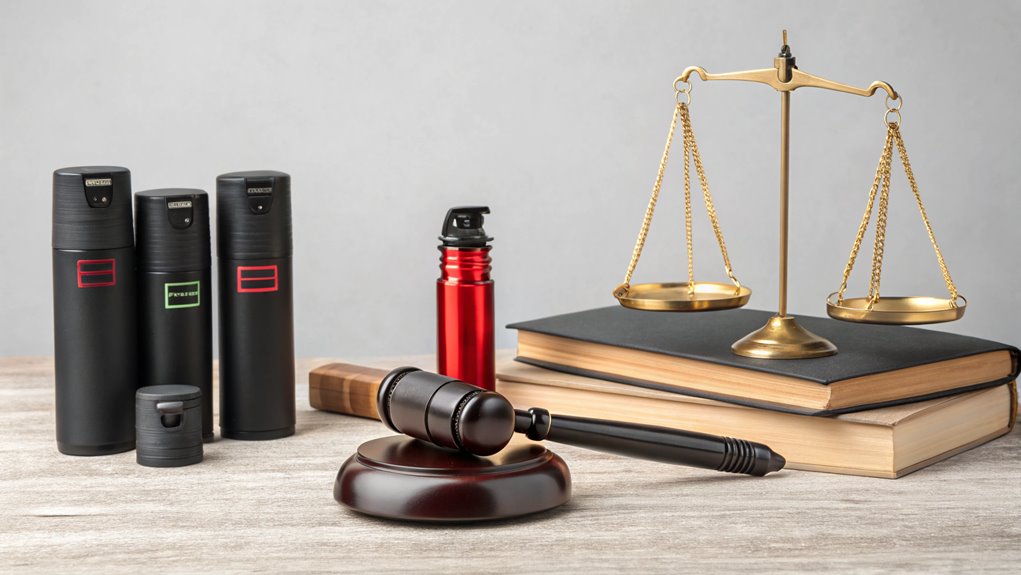
When it comes to staying safe, understanding the legal rules surrounding pepper spray is vital. You might think of pepper spray as just a self-defense tool, but its history and legal definitions are important too. Originally created for law enforcement, pepper spray has evolved into a widely used self-defense option. However, knowing the legal definitions is essential, as laws vary regarding size, strength, and usage. For instance, some places define pepper spray strictly as a self-defense weapon, while others see it as a weapon that can be abused. This means that if you're caught using it inappropriately, even for self-defense, you could face serious consequences. It's important to note that Mace Personal Model Black, with its UV detection dye feature, can aid in criminal investigations, showcasing its advanced functionality. It's all about understanding how your local laws relate to pepper spray. You should also consider the type of pepper spray you're carrying; different formulations can have different legal implications. The Mace Pocket Model Triple Action combines OC Pepper, CN Tear Gas, and UV Marking Dye, which may have specific legal considerations depending on your location.
State-by-State Legal Variations
Maneuvering the legal landscape of pepper spray can feel like walking through a maze, especially since laws vary considerably from state to state. Each state has its own rules about pepper spray, meaning what's legal in one place might be a big no-no in another.
For instance, some states allow you to carry pepper spray without any restrictions, while others might limit the size of the canister or the strength of the spray. In some places, like California, you can carry it, but you can't use it unless you're in immediate danger.
On the other hand, in New York, you can't carry pepper spray for self-defense unless you have a specific permit. This can get confusing, especially if you're traveling or moving.
It's essential to research your state laws before purchasing or using pepper spray. You don't want to find yourself in trouble just for trying to protect yourself. The Mace Jogger Pepper Spray Pink is a compact and portable option that aligns well with the legal stipulations in many states, making it a popular choice for outdoor enthusiasts.
Knowing the rules can help guarantee that you're prepared, not just regarding safety but also legally. Always be aware of your surroundings and local regulations, so you can navigate this maze with confidence and keep yourself safe.
Minimum Age Requirements
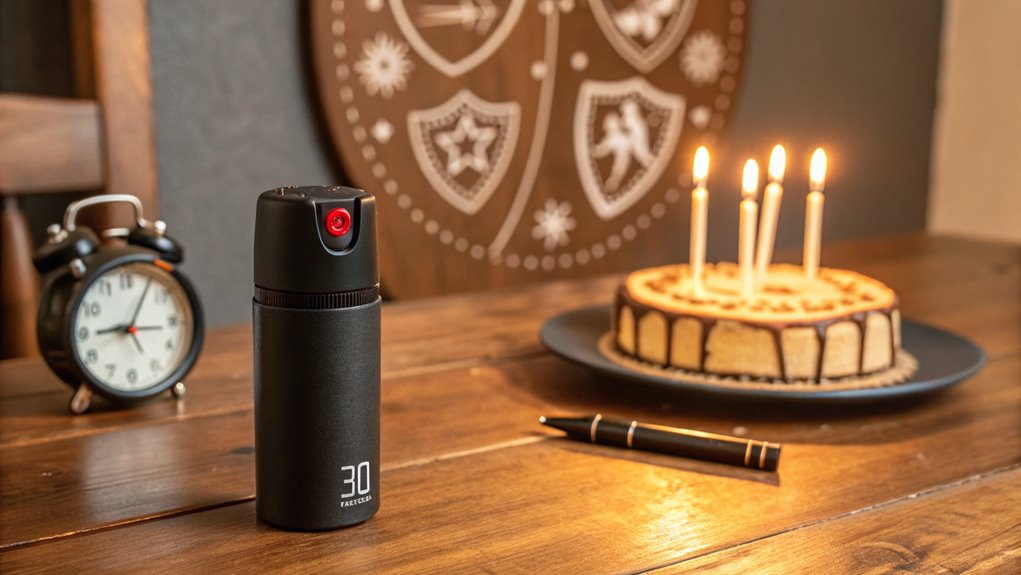
Often, it's important to know the minimum age requirements for purchasing and carrying pepper spray, as these regulations can differ greatly across states.
In some places, you might need to be at least 18 years old, while other states allow younger individuals, like those who are 16, to carry it with parental permission. Understanding these minimum age laws is vital, especially if you're considering using pepper spray for personal safety.
The legal implications of not following these age requirements can be serious.
If you're caught carrying or using pepper spray without meeting your state's minimum age, you could face fines or even legal trouble, which can impact your future.
It's not just about having the spray; it's about knowing the rules that govern its use.
Permitted Uses of Pepper Spray
Understanding the permitted uses of pepper spray is essential for anyone considering it for personal safety. You might think of pepper spray as a handy tool in your self-defense tactics toolbox. It's designed to protect you when you're in a dangerous situation, like if someone tries to attack you. When used correctly, pepper spray effectiveness can give you time to escape and seek help.
Now, it's vital to remember that pepper spray should only be used for self-defense. This means you can't just spray someone because you're mad or annoyed. It's meant for those moments when you genuinely feel threatened. For instance, if a stranger is getting too close or acting aggressively, using pepper spray could be an appropriate response.
However, you should always be aware of your surroundings and the local laws regarding pepper spray. Different places have different rules, and knowing what's allowed will help you stay on the right side of the law.
Always treat pepper spray with respect, and remember, it's a powerful tool meant for keeping you safe in an emergency. Stay smart, stay safe, and use it wisely!
Restrictions on Spray Types
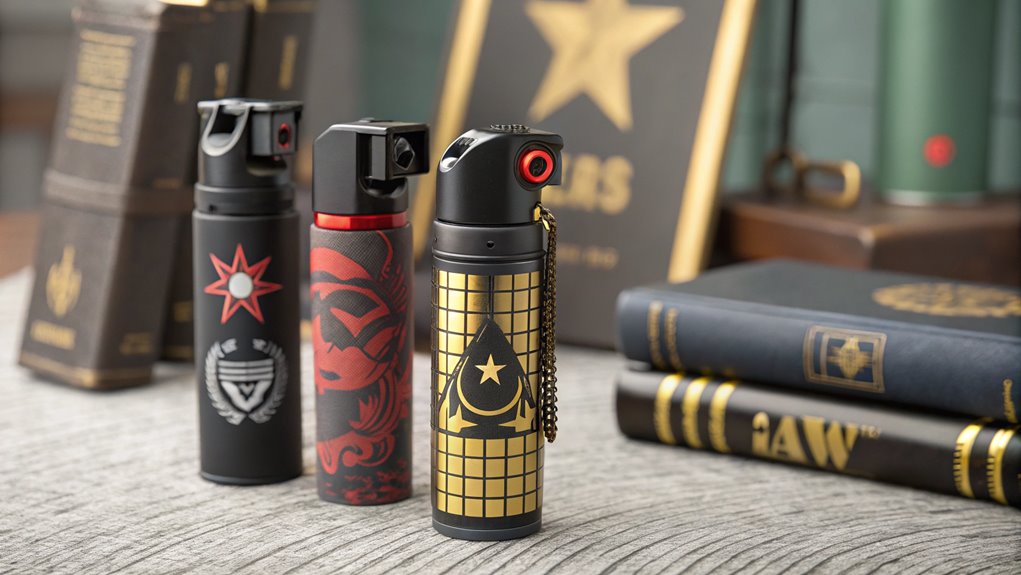
While knowing when and how to use pepper spray is important, it's equally essential to understand the restrictions on the types of spray available. Not all spray formulations are created equal, and some can get you into serious trouble if you're not careful.
Many states have laws that prohibit certain ingredients in pepper spray. For example, if a spray contains prohibited substances like tear gas or certain chemicals, you could face hefty fines or even criminal charges.
You should always check your local laws to make sure the spray you're thinking of buying is legal. Some areas only allow specific formulations, like those that contain a certain percentage of capsaicin, the active ingredient in pepper spray.
It's vital to know what's allowed before you make a purchase.
Carrying Pepper Spray in Public
Many people carry pepper spray in public as a means of self-defense, but it's crucial to know the legal implications of doing so. When you decide to carry pepper spray, you're taking a step towards ensuring your personal safety, and that's commendable. However, you must be aware of the laws in your area because they can vary greatly. Some places allow it, while others have restrictions on size or strength.
Before heading out, check your local regulations, as certain areas may prohibit carrying pepper spray altogether. Remember that using pepper spray is a self-defense technique, and it should only be used in genuine situations where you feel threatened.
Carrying it responsibly means understanding its purpose and being prepared to use it only when absolutely necessary. Also, keep it accessible but out of reach of children, as public safety is a priority.
Think about how you'll handle the situation if the need arises—being prepared can make a difference. Stay aware of your surroundings, and make smart choices.
Ultimately, knowing the rules can help you use pepper spray effectively and legally, allowing you to feel more secure when you're out and about.
Legal Consequences of Misuse
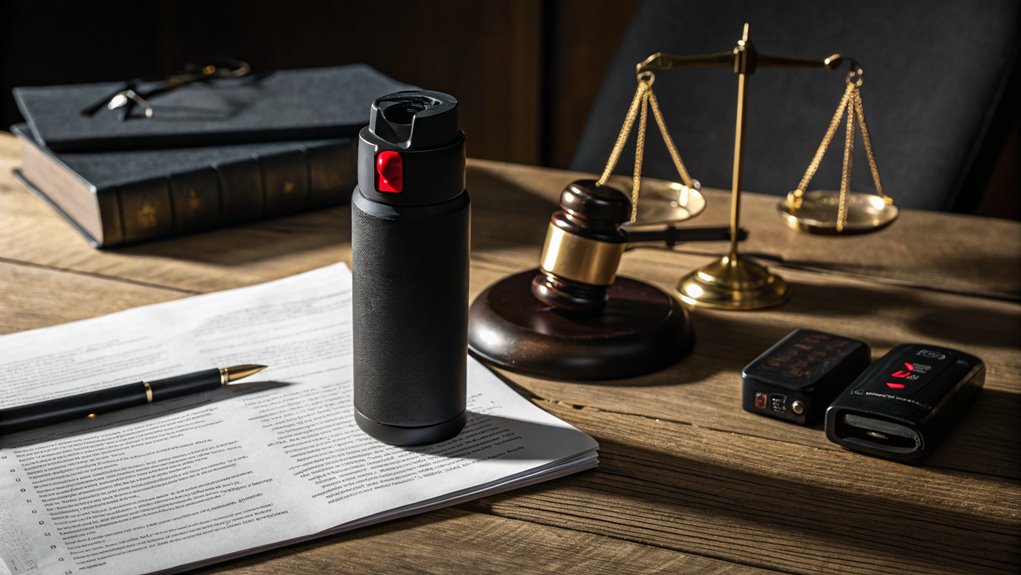
Using pepper spray comes with significant responsibilities, and misusing it can lead to serious legal consequences. If you think you can just spray someone for any reason, think again! Misuse ramifications can include hefty fines, community service, or even jail time, depending on the situation.
For example, if you spray someone who's not a threat or in a crowded area, you could face charges like assault or reckless endangerment.
Imagine getting into trouble just for trying to defend yourself! The legal penalties can be harsh, and they don't just stop at a fine. A conviction could lead to a criminal record, which might affect your future job opportunities or even your ability to own pepper spray in the first place.
Also, it's important to realize that even if you feel scared or threatened, using pepper spray must be a last resort. Always assess the situation carefully and act only when you truly need to protect yourself.
Transporting Pepper Spray Legally
Transporting pepper spray legally requires understanding the regulations in your area.
It's essential to know the local laws, as they can vary considerably from one place to another. For instance, some states allow you to carry pepper spray in your bag, while others may have restrictions on the size or strength of the spray. Make sure you're aware of how much you can carry and how it must be stored.
When you're using different transport methods, like walking, biking, or driving, always keep the pepper spray accessible but secure.
If you're in a vehicle, it's often best to store it in the glove compartment or a console where it's not visible but easy to reach in an emergency. Avoid keeping it in a place that's hard to access, like the trunk, because you never know when you might need it.
Considerations for Self-Defense Claims
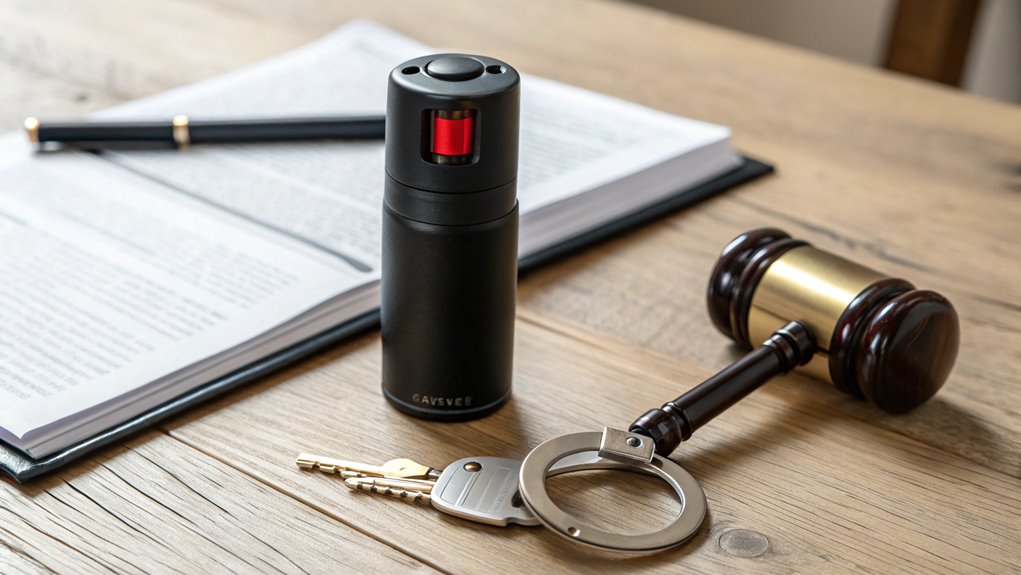
When considering a self-defense claim involving pepper spray, it's important to understand the legal standards that apply in your jurisdiction. You need to know what's considered reasonable force in self-defense scenarios, as using pepper spray can be a gray area. Courts usually look for clear legal justifications for your actions, so if you ever find yourself in a situation where you use pepper spray, it's vital you can prove you felt threatened.
Here's a quick overview of factors to keep in mind:
| Factor | Description | Importance |
|---|---|---|
| Immediacy of Threat | Was the threat immediate and real? | Essential for justification |
| Reasonable Force | Was the level of force appropriate? | Key to legal acceptance |
| Your Perceived Danger | Did you genuinely feel in danger? | Supports your claim |
| Alternatives Considered | Did you try to escape or avoid confrontation? | Shows responsible action |
| Local Laws | What do your local laws say about pepper spray? | Critical for defense |
Understanding these considerations can help you navigate the legal waters surrounding self-defense claims with pepper spray. Stay safe!
Important Resources and References
How can you guarantee you're well-informed about the legal implications of using pepper spray?
It's essential to tap into reliable legal resources and understand the rules that govern pepper spray use in your area. Start by checking your state's laws, as they can vary widely. Websites of regulatory agencies, like the Department of Justice or your local law enforcement, often provide up-to-date information on self-defense laws and any restrictions on using pepper spray.
Don't stop there!
Look for local legal aid organizations or self-defense advocacy groups that can offer guidance. They often have resources, pamphlets, or even workshops that explain the legal boundaries in a way that's easy to understand.
If you're still unsure, it's worth consulting a lawyer specializing in self-defense laws. A quick chat can clarify any confusing points.
Answers to Common Questions
Can I Use Pepper Spray for Personal Protection While Traveling?
When you're traveling, consider your travel safety. While pepper spray can be an effective self-defense tool, you must check local self-defense laws, as regulations vary widely between locations and may restrict its use.
Is It Legal to Use Pepper Spray on Animals?
Using pepper spray on animals can open a legal Pandora's box. You might face serious legal consequences, violating animal rights laws. Always check local regulations before considering such actions; ignorance won't protect you.
How Should I Store Pepper Spray at Home?
You should store pepper spray in a cool, dry place, away from heat sources and direct sunlight. Following safety precautions, keep it out of reach of children and pets to prevent accidental exposure.
Does Pepper Spray Expire or Lose Effectiveness Over Time?
Yes, pepper spray does expire. Its shelf life typically ranges from two to four years, and you might notice effectiveness degradation over time. Regularly check the expiration date to guarantee it's still reliable when needed.
Can I Carry Pepper Spray in My Car Without Restrictions?
You can usually carry pepper spray in your car, but it depends on your state regulations. Always check local carrying laws to verify you're compliant and avoid any potential legal issues while transporting it.
Bottom Line
So, whether you think of pepper spray as your trusty sidekick in a tough situation or just a neat gadget, remember it's not just about having it; it's about understanding the rules that come with it. Laws can vary, and misusing it can lead to serious trouble, like a double-edged sword. Always stay informed and use it wisely, because your safety matters, and knowing the legal side keeps you one step ahead in protecting yourself.




